
While Barry Hearn as the chairman of World Snooker is the man responsible for commercial side of professional snooker, the man at the head of the sport’s regulatory body, the WPBSA, is former world number 28 Jason Ferguson, who since his re-election to the board as chairman in July 2010, has overseen a period of unprecedented change in professional snooker.
Three years on, I sat down with Jason this week at the Crucible to discuss a number of subjects, including flat draws, money based ranking lists, the Crucible, burn out, snooker in schools, the amateur game, wildcards, and much, much more.
PSB: Looking back to 2010, Barry Hearn and yourself came back to snooker with what has been described as a ‘five year plan.’ Now, three years into that plan and about to start the fourth, how happy are you with the progress that you have both made so far?
Jason Ferguson: I think that we are delighted really. We have faced some challenges along the way, if you were to realistically look down at where we have come from and where we have come in that period of time, I don’t think that people would have believed it.
It’s not perfect yet by any means, but to think that we have gone from six events with £3.5m in prize money, to around £7.5m next year already, with things in the pipeline that we are working hard on, we are absolutely delighted. It would be nice to top that £8m by the end of the season, that will be the target for us to go for.
I have to say that the team we are working with are testament to what is actually going on. It’s not just Barry Hearn, but also the input that Matchroom Sport bring in terms of the way that they distribute television. Without a doubt they are made for our business, the way that they operate. There’s a whole team there within Matchroom Sport who do a terrific job and on top of that, what we are doing as a governing body to help develop the game properly, we are seeing some astounding results to be honest with you, particularly recently.
We have now got national governing bodies working within 87 countries around the world and also on top of that, they’ve all seen increased interest in participation, in competition and obviously our viewing figures are massively up as well.
The World Championship is a great time to take stock of where we are and where we have come to. We will be sitting down tomorrow and we will be having a chat about where we have got to at the end of another season. Amazingly the new season is about to begin, it’s unbelievable.
PSB: In terms of Matchroom Sport who you mention, what do they bring to the table exactly?
JF: In terms of Matchroom Group, it’s not just Barry and it’s not just about selling television, it’s about the way that they go about things, the way that they build a sport. They’ve got people in media, people in production, people working on profiling the sport properly. There is a whole team of people, probably around 200 people within the Matchroom Group.
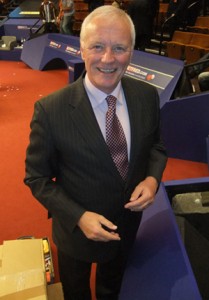
Barry Hearn at the Crucible in 2010
This is what we bought into three years ago. I faced some criticism to say that there is a danger that we were selling the game down the river, but what we were actually doing was getting the opportunity to buy into that team, for a relatively small amount of money, when you compare what the returns would be already. It’s a whole team of people and everybody in that team brings something to the party for snooker, so as I say it’s a marriage made in heaven.
But on top of that, the way we have bonded as a team within World Snooker. Brandon Parker has brought a lot to the party in the European tour. He’s also made a huge success out of the German Masters, you only have to turn the TV on when that is on and see 2,500 people and you can’t get a ticket.
PSB: And seven tables in the arena next year!
JF: There will be an increase! I think that we are facing the most interesting year of snooker that we have ever seen. I think that some of the results in the World Championship this year are testament to what has been going on in the sport.
The thing is every player is playing all the time now. Gone are the days where 16 players were playing all year and the rest went to the qualifiers. You have now got tough competition in every round and I think that is what you are seeing now with some of the players that are coming through. Stuart Bingham, Mark Davis and Barry Hawkins, these players have been around a while, but just struggled to break through and I think that the one thing that they have benefited from is playing all of the time.
PSB: Obviously the new calendar is out now (provisionally at least as I’m sure that there will be some changes here and there), but how happy are you with that?
JF: I’m totally satisfied. Earlier in the year there were certainly some concerns about how wildcards were being introduced, a lot of concerns about holding matches over to final venues, because it does give people a bit of an unfair advantage.
So in the discussions that Barry and I had, I’d said from my side that we can support this, but there are certain things that we need to see. One is that we need to manage better the way that wildcards are being introduced. We need to make sure that it is fair for everybody We don’t want to see preferential treatment for certain players, there has to be a level playing field for all players and where those matches are played is very important as well, the standard of the conditions. You can’t expect the tour to be played behind closed doors.
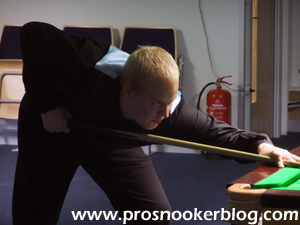
Allan Taylor described his diary for next season as ‘looking like it had acne’
The vision there from the WPBSA side was to ensure that arenas will be open, that people can come in and watch. Think of it this way, if a young boy qualifies for the tour and plays Ronnie O’Sullivan in his first tournament, his local club are going to want to bring a bus load. It’s not fair to play that match behind closed doors. Let’s get people in, let’s show what snooker is and create some new stories. So we laid down what we needed in making that tour fair and I have to say, we are 90% of the way there in terms of getting everything that we wanted.
I am very happy with the wildcard situation, that came out of our negotiations in China. We have managed to put a better system in place for that.
PSB: No ex-pros, down to four per event, no repetition of the same wildcards at different events during one season…
JF: Yeah exactly. That was from listening to our membership. There were a number of players among the membership who were quite vocal about the way that things should be and fairness and I love good feedback.
A lot of people criticise Peter Ebdon for saying certain things some times, he is quite open in the way that he talks but he is a player who will take the time to write to me and outline the reasons why he says something and I respect that. There are other players out there who always attend players meetings and give good, constructive feedback.
Sometimes I hear a player complain about something, but you never seen them at a players meeting, you never see them around at the venues and they never turn up when you want them for something, so I get a little bit frustrated sometimes.
But the majority of players, the feedback that we have received, has been put into practice. I believe that we have delivered a fair tour for next year and I don’t think that any player on the tour could argue that that tour isn’t fair.
PSB: You are obviously restricted by contracts in places such as Shanghai and Australia, but in your head, how close are you with the calendar to making the ultimate vision in your head, a reality?
JF: Australia has another year to run under the current contract. There is always the opportunity to renegotiate.
Shanghai have expressed interest in changing their event. I have to say that we had already announced that those three events would remain the same and to be honest with you, it was more on the side of us saying that ‘no we’ve announced that and we are going to run with that this year.’ This is an interim year where we are bringing a new system in, let’s not go too far forward otherwise we might a mistake.
So we’ve sat tight on those three events. Australia we’ll be in talks with soon about renegotiation so anything could happen there and Shanghai I’ll be seeing the promoters shortly. Again we’ll be considering that going forward, but I have to say that the promoters that we have in Shanghai are some of the best that we have got on tour. It’s a superb bunch of people, it’s a great operation, so that’s still possible.

The Crucible – ‘not broke’
The World Championship, you can’t help but look in that arena and say that this is not broke. You just can’t help but do that and that’s why it will stay the way as it is and as far as I’m concerned it can stay in Sheffield forever. While we get the support of Sheffield City, we will continue to come back here because let’s not underestimate, this is where our heritage and our history is.
I’ve just been in the arena and I was fortunate enough to play here three times. You walk out there, you don’t realise how close the tables are to the audience, you can feel the atmosphere out there and particularly if you are cueing from the corner of the table where your opponent is sat down, you feel like asking him to move before you can play. It is so tight in the arena, it’s a very special place, the atmosphere is amazing and the players feel it.
It’s built up in such a way that you ask any snooker player, we’ve got qualifiers for the European Championships going on in Sheffield today, European amateurs playing under a new amateur ranking system which we introduced in our discussions with the EBSA. That will produce three tour players today and I am going to bring those three boys down here and I am going to take them into the arena and the first thing they will say to me is ‘I want to play here’ and there’s no doubt about it, this is a magical place.
PSB: As you know, I was at the World Championship qualifiers last week, which has become such a big event in itself. Have you got any plans for those at this stage?
JF: Well at this stage, my view is that the qualifiers for the World Championship will remain in place at Sheffield. That is certainly what I would like to see and I think that would be the right way forward. This is the World Championship, which is played in Sheffield and I think it should start and finish in Sheffield.
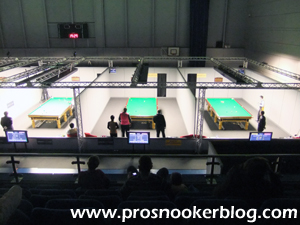
The World Championship qualifiers
I’ve really enjoyed this year that the qualifiers were so close to the final stages. I think just to have the event built up from day one of take off in Sheffield, it grew and the qualifiers grew as the event went on and then almost immediately we arrive at the Crucible Theatre. For me that is the way forward and the way that we should always play the World Championship.
PSB: Talking about flat 128 draws generally, obviously this is a big talking point ahead of next season. Can you talk us through the thought process behind that switch?
JF: If you were to give me a clean sheet of paper, three years ago, and you would have asked me to devise a professional tour, I would have written at the top of that page ‘128’ and I would have said 128 players, everybody in round one. It’s clearly the right way forward. There is not a single player out there who could say that this is not fair. It is the only fair system that we can use.
We know that our players have been used to some protection, that the players have earned the right to that and we take that into consideration in the way that we are slowly easing this in, but for me this will definitely create some unusual results. I think that it will probably create a few shocks, probably shocks to the outside world. For you and I who understand the game, not such big shocks because we know how many great players there are. And I think that it will bring in some new characters as well.
Not only that, but we’ve got so many events going on around the world in terms of qualifying and amateur development, that we know there are going to be some new stars come from new countries. We have seen how big this week our friend from Thailand has taken the world alight. In fact I contacted the President of the Thai Association on the morning Dechawat Poomjaeng had played his match and the media interest around the story, that he had actually played here and won at the Crucible Theatre, was amazing.
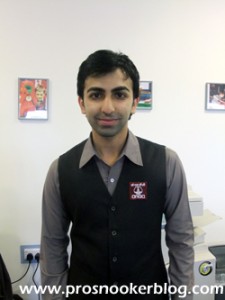
Pankaj Advani
What this new tour structure will do, it will allow more of that to happen. It will allow new players to come through. We’ve got two Indian players on the tour, Aditya Mehta and Pankaj Advani, who both had some good results this year. Pankaj has made the amazing shift from world billiards player, now playing on the world snooker tour.
The current system restricts these players if you seed players through. The only fair system to allow these players to compete on an equal footing, is a 128 flat draw where they get the same opportunity as the man who is sat next to them.
PSB: You talk about new ways for players to come on tour, have you thought of anything like an Asian Q School or something similar?
JF: I think in the longer term, I do see Q School as a great opportunity. Some players don’t have the opportunity to play all year round, some don’t have the ability to travel so much. To qualify for the main tour, Q School is a great idea because clearly you can start out and you can be on tour within a week. At least then for the next year you know what you are going to be doing. If you don’t qualify, you can go back to work and that has got to be a good system.
And not only that, but it gives the opportunity to those players that fall off the tour the opportunity to get that back. Those players that fall off aren’t necessarily the players that should fall off or deserve to fall off. 64 players is quite tight to stay on the tour, there is some tough competition in there. You finish 65 in the world, you are off the tour, it doesn’t mean that you are not any better than the players that are coming on tour, it just means that you finished 65, you might have had a bad season, you might have had a whole host of reasons…
PSB: Rod Lawler obviously…
JF: Rod Lawler was a typical example, great player, been around many years, fell off the tour, was thinking about giving up, thought he’d try his hand in Q School, qualified for the tour and then won a ranking event. It’s unbelievable, it’s a great story.
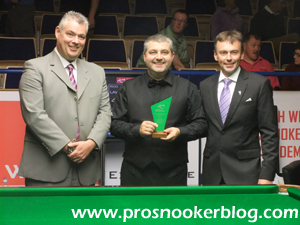
Rod Lawler, pictured with Jason at the UKPTC3 event in Gloucester earlier this season
So I do think that Q School is a great idea, but I do think that we do need to consider the longer term spread of Q School. I think again there is a strong possibility that we would have a Q School here in the UK, or I would like to class it was Europe, we tend to look at our development as Europe and Asia, rather than the UK and China, there is a distinct possibility that we would one day introduce Q School in Asia.
PSB: On the subject of the main tour, are we looking at 128 next season or is that a work in progress?
JF: Yeah there is some work in progress on the numbers and again we are just waiting for these last few qualifiers to get in, but the target number is 128. We are not far away from that and I think we are going to hit the target.
PSB: And how important is it to continue to support the other amateur tournaments, the European Championships, the IBSF and so on…
JF: Well it’s interesting that you raise that actually. I’m going to let you in for a bit of a snippet now, which is not in the public domain yet. Yesterday, we brokered a deal to take our place within the World Confederation of Billiard Sports, which is the umbrella organisation which retains Olympic recognition for billiard sports.
So the importance of the IBSF, the European Association and the Asian Associations is one of unbelievable importance to what we do and there are many reasons for that. We have talked about already the qualifying tours that we have got going on within the national governing bodies for those countries, but we also have to remember that a lot of these federations are run by government offices, who have a direct relationship with the IOC and they have a direct relationship to the sports bureaus around the world, which have access to funding to develop sport. That is a key area that we have been tapping into within the last few years. I think we have got opportunity to take that to a whole new level.
If you look at the size of the grants coming from the IOC into other sports, like tennis for example, those are substantial amounts of money to develop sport. I believe by working in partnership with the IBSF, the national governing bodies and also dipping into this global structure under the umbrella of the WCBS, that we can actually take our seat one day, at the Olympic Games.
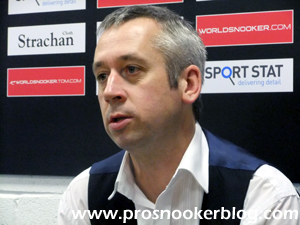
Nigel Bond – 2009 World Games winner (snooker)
We know that is a long, long way off and is the long term goal, but the short term goals that we can achieve along the way include opening up new funding, opening up new events and opening up new opportunities to develop snooker in countries that we have not done it before, or developing further in countries where we are already working.
That we are already seeing the results of, so I am keen to take the WPBSA along that road and I have to say that yesterday ,the WCBS accepted changes and brought in a new constitution, which allowed the IBSF and the WPBSA to sit side-by-side in the global development of snooker. That is fresh off the press and is a monumental thing for us.
We’ve had here the president of the World Pool Association, we’ve got here this week the UMB, which is Union Mondiale de Billard, which is three cushion billiards. So together there are 3 seats on the board of each for the WCBS and through the WCBS, we already have participation in the World Games which will go ahead in Colombia this year in July and we’ll be sending 13 countries to compete for medal in the World Games in snooker.
PSB: So how are the players selected for that, by ranking?
JF: Players are selected by ranking. We’ve put an expression of interest out to our membership. The IBSF choose eight, we choose eight, together we sit down and we have to devise the countries that need to participate and there will be representatives from 13 different countries, the minimum is 12 to comply with the IOC charter.
That will be an exciting time for snooker. This is our showcase, the World Games is the second-largest multi-sport games in the world, it is second only to the Olympic Games and any sport that has Olympic recognition and wants to become and Olympic sport, or wants to retain that Olympic recognition, whether participated in as a sport or not needs to be in the World Games.
It is the key to the safe, so it is something that we have to do to develop properly. So we are very excited about that, very, very excited. It has gone down particularly well in some of the countries that we are looking to develop in, certainly the Middle East look upon participation in the World Games as a big thing and certainly in China and 90% of Asia view it as the starting point. In Asia there are substantial grants for athletes who come through that system and that is where we are trying to develop and give more opportunity.
PSB: It has a good spot in the calendar as well, it is not clashing with anything so there is no reason why players should not be able to compete?
JF: No, obviously we have been planning this for quite some time in line with our development plan and we have actually left the gap in the calendar and worked around it, because we want the ability for our host countries to be able to send their athletes to compete for these medals. It is very important.
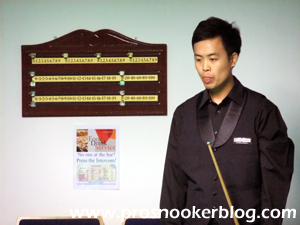
Marco Fu – 2010 Asian Games winner (snooker)
We’re also involved with the Asian Indoor Games which goes on a little earlier this year and we are also pushing for the Asian Games which is very big as well in Asia. This is nothing new, but it is new to have this fresh approach, to be able to drive it, because when we look at cue sports globally, it is really us that has the resources and the staff and the team to be able to drive these projects forward.
That is my vision, that we will become the world leaders in cue sports, to actually develop our sports properly, as we have seen some of the other sports develop.
PSB: Last week as well you had the ladies day, have you got any plans for the ladies game?
JF: Yes I have, it is interesting because we are talking about this Olympic programme, the World Games and how we access funding and one of the key parts of that is our demographic. Let’s look at the people who view our sport, let’s look at the people that are involved in sports development and there is a very limited number of ladies, a very small number and that is something that I want to work with.
We’ve had a world ladies association that has been running for quite some time and it has operated and there have been some good people who have kept it going, but it needs to fall in line with the system that we are working with. It needs to fall into the national governing body network and operate through the regions throughout the world. If it does that, it could create a world tour of events.
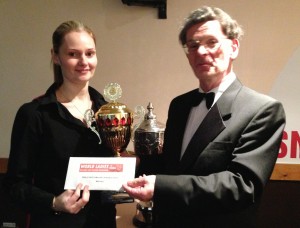 Reanne Evans claims her latest world title earlier this month
Reanne Evans claims her latest world title earlier this month
I am not saying that they are going to be massive events, but it could create a tour of events, which will allow ladies to compete at the same level as men. We have seen some great lady players, I was watching Reanne Evans in the Cue Zone yesterday. She hits the ball as good as anybody that is competing on our tour. There’s no reason why ladies couldn’t compete. One day I would like to see a lady playing here at the Crucible in the finals of the World Championship, it’s not impossible.
PSB: We have spoken about flat draws, obviously the other hotly debated subject is that of money lists, rankings and so on. What is your view on that? Obviously the ranking list may become less relevant with flat draw, but there are still issues to be resolved…
JF: There are still issues with it. To be honest with you, it is one of the things that we’ll continue to discuss with our membership this year, because there is a percentage of our membership which don’t like the prize money ranking list.
From a commercial point of view, I see it first hand because I am in negotiations with governments, I am in negotiations with sports bureaux, national governing bodies, sponsors and TV companies. I am at the front end of it when travelling and I see what an advantage this can be.
I have already received offers from people who have wanted to put more prize money in, because they have wanted a bigger ranking event, so there’s a very strong commercial ar0gument and I support that argument.
But on the other side of it, we need to make sure that it works and I think that’s where your expertise will come in Matt because you are a genius when it comes to ranking lists. We have looked at it, we have broken it down, we’ve still got seeding issues in terms of the three events that aren’t flat draws. If everybody was coming in, in round one in every event and you were starting with a clean sheet of paper, there’s no reason why it wouldn’t work.
PSB: I notice that for those events under the old system, that you will be awarding ‘half money’ for the seeded losers in those events…
JF: Yes, it is half money for the seeded losers first round which I think is the only fair way to do it. There are some issues with that. We will continue this year to have that debate and we will be calling a meeting shortly with our members to discuss that issue, amongst the other issues relating to the new tour structure.

It’s going to be a bit of a shock to some of the guys this year, to be playing more matches and certainly some of the top players are going to have to go to the qualifying venues.
The money list will come in at the end of the next season, that’s the target, but we need to make sure that it works. By the end of the forthcoming season, we will have two years points and we will be able to assess exactly if it works or if it doesn’t work.
Personally speaking, I think I works, I don’t know what your thoughts are, but I’d like to hear them.
PSB: To be honest at first I was quite sceptical, but the key thing for me is that you can’t look at that change in isolation, you have to look at all of the changes together. One thing that struck me this week is that Ronnie O’Sullivan could win the world title two years in a row and still be ranked around 20th – that can’t be right can it?
JF: That’s certainly something that concerns me about it. Ronnie has taken a lot of time out this year, but because the increase in prize money at the World Championship makes it so much bigger, it does allow for a player to come back after a long break and still be highly ranked.
I have got concerns over that, I actually think that is an issue and the only way that can become less of an issue is if the prize money increases in all of the other ranking events and that’s what we have got to do. I think that we have got to continue to look at pushing prize money up to limit that situation.
The other concern about the prize money ranking list is that it can devalue some of the tournaments. I think if you look at the Asian Tour at the moment, £50,000 prize money for those events, in comparison to £100,000 in a European Tour event. In ranking terms those events are really equal, but actually under the new system they will be differentiated and that is where it causes some problems.
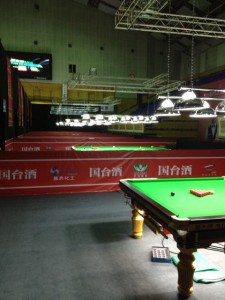
APTC1
It is something that we are going to have to monitor. I will be speaking to our promoters in Asia about increasing the prize money in the Asian Tour, because that’s a conversation that is already underway.
We come back to that commercial argument, will this prize money ranking list increase the commercial value of our sport and I can honestly tell you that it will, without a doubt.
PSB: Because their name will be associated with the top prize and so on…
JF: Absolutely. Promoters will definitely look to push more prize money. If we look at this year, the prize money in the UK Championship and then if we look at the International Championship, that has dropped to number three. I know for a fact that this conversation is going to be had about why it is number three now and not number two. The reason for that is prize money.
It does create a situation where everyone can see what is going on, it is very transparent. But the other thing that it creates is a simple system that people can understand. Why has he got 10,000 points? Because he has won £10,000, it’s really simple.
The current ranking system is really simple for people like you because you are really clever, but for people that perhaps don’t have the information or wouldn’t have the time to look up the information, they don’t really understand the rankings system and I think that is certainly where Barry is coming from.
We’ll continue to talk to our membership and take a view.
PSB: One thing that strikes me as being potentially confusing is the issue of exchange rates and making sure that it is easy to understand…
JF: It could be, but we will do it all in UK pounds and we will have to look at it like that, it’s the only way.
 PSB: One thing that struck me in the arena the other day, we have had John Higgins, Mark Allen, Mark Selby, Mark Williams coming in after matches and they have all spoken immediately after their matches about the need to pick and choose events going forward. Is that something that you would encourage, or see as a necessity these days?
PSB: One thing that struck me in the arena the other day, we have had John Higgins, Mark Allen, Mark Selby, Mark Williams coming in after matches and they have all spoken immediately after their matches about the need to pick and choose events going forward. Is that something that you would encourage, or see as a necessity these days?
JF: I think it is becoming a necessity for the players. I spoke with Mark Selby last night and he was clearly devastated that he had lost. There’s no question of it, he is burnt out. He has had an exceptional year where if he has not won a tournament, he has been in the latter stages, so he’s been pushed to the limits, I think both physically and mentally.
While we’re not a fitness sport, you have only got to take a look out there, the fitter, the stronger, players are actually going further and staying longer. The reason for that is it’s hard, it’s mentally exhausting, the travel commitments are enormous. I know that, it’s unbelievable the amount of travelling involved, recovery times are getting less between events.

Burned out? Mark Selby
I think that’s an issue that we are going to have to continue to look at. I think we will certainly look at our calendar and certainly some of the new players coming on the tour will give consideration as to whether they are going to play in everything or not or whether they are going to take some short breaks, or miss an Asian Tour event, or miss a European Tour event, or even miss a ranking event.
I know that there is some talk amongst the players that they may miss one of the early ranking events, so that they can take a longer summer. Now my father worked down the mines all his life, he did 12 hour shifts digging coal out, he did it year-in, year-out and I never heard him complain once.
Some people might say, oh poor things, they are doing something that they love, they are out there, in front of an audience, everybody likes them, they have become celebrities, what are they moaning about? But we have to face it, it is a gruelling schedule, and it is tough.
You have got to be fit, you have got to be ready for it, you’ve got to be mentally strong for it, it’s not just mentally strong in terms of fitness and playing the game, you have got to be mentally strong to deal with all of the different countries that you are going to, different foods you are going to. It’s hard, going.
I think that some of the players have suffered from burn out this year, but others are relishing it. I’m fortunate, I’m a very good traveller, I travel to Asia, I get off the plane, put my tie on in the toilets in the aeroplane and go to the first meeting as soon as we land and that’s how it is. I can do it, but some people don’t travel so well.
PSB: It’s a difficult one, because you have players saying for example that they will not be playing in Australia, but as a governing body you need that event to be supported. How important is that for you to find a balance between allowing players to miss tournaments, but then making sure that they don’t all miss the same one?
JF: It is difficult. The one thing that I will say is that the game is bigger than the player these days and I think what proves that is that we have seen record ticket sales this year, long before Ronnie announced his comeback. I am sure that his comeback did encourage people to buy more tickets, but the game is bigger than a single player and we can afford to lose a few players here and there in tournaments.
But if all the players miss one tournament, then it isn’t good for us as promoters. We would hope that whilst we are still within this period of growth, that the membership, the players, will support these events. It is important to us. We are in the position of negotiation with Australia now. If the players don’t support the event, the negotiation will be much harder.

We’ll be keen to see as many players play as possible, but by the same token, if players want to pick and choose, we don’t have a problem with that. There’s been some talk in the media about that we are forcing players to go, but we don’t force anybody to do anything. Yes they sign a players contract which has certain restrictions in terms of what they do and don’t do, but in terms of playing in tournaments, entering events and not entering events, players can pick and choose and enter whatever events they want to and if they don’t want to enter, they don’t have to.
But what we do say is that if you do enter, make sure that you turn up.
PSB: Do you think that in the future, there is some sort of scope for a system such as that used in tennis where the best of a set number of events count towards a player’s ranking, for example in tennis it is the best 18 results.
JF: You know I have heard this question a lot, there are quite a few players who have suggested that we could do that, but it is messy you know, from a PR and a media point of view. A clean system is there are the points, that’s what you win if you win, that’s what you get if you don’t turn up. It’s very simple. Once you start playing with figures it does become very difficult to market the ranking list properly.
The one thing that we will be able to do with this new ranking list and the fact that we have got players at 128 in the round, is that we will be able to re-seed very quickly. One day we’ll be able to start and finish and event and produce new ranking lists
PSB: Indeed, you have got six cut-offs next season haven’t you? Up two from this year…
JF: Exactly, which is good news for snooker, it’s excitement, not only for people watching it and the changes that you are seeing but it actually creates more competition amongst the players, there is more to play for every time.
If you are thinking of missing Australia and Wuxi this year and you are number 18 in the world, and you know that a few players above you are going to miss that tournament, you are going to stop and think to yourself ‘hang on I’m going to enter this, I’m going to make up some lost ground.’ That’s certainly the way that I would be thinking.

Wuxi
It would be great to get to a position where we could re-seed after an event, but if you look at how difficult our calendar is to manage now it’s not easy. What we tried to do is to create more cut-offs and actually look at the way it is fair in terms of the events that are dropping off and which events are coming on.
You study it all the time. We think that we have done the fairest possible way that we can in terms of cut-offs this year. It’s interesting, I actually think that we are going to get to a point where events will start overlapping, I certainly know how many discussions I have got going on with various countries and I am starting to think that…’where am I going to put that one? What’s going to happen if we get that deal, where will that go…?’
PSB: So do you think that we will have a situation where people will have to choose which events to enter?
JF: I do. I think that we will end up like tennis and golf eventually. I think that you will end up with two or three events going on at once possibly, if you look at how tight it is now, some players will probably be thinking ‘I will go to that one, but not the one in front of it.’
So in a nutshell, we’re busy!
PSB: On another note, this week you unveiled the Cue Zone Into Schools scheme, tell us a little about that…
JF: It’s a development that has come out of our coaching and development plan. It is clearly linked to good reasoning. It makes sense that if you want future stars, future viewers, future ticket buyers, future interest in your sport, then you have to introduce it to young people.
What we’ve found through the coaching scheme is that we have trained around 200 new coaches and a number of those have created little niches for themselves, got involved with some schools and Chris Lovell, head of the World Snooker coaching team, we have regular meetings on development strategy. The schools programme to be honest with you is something that he has designed. He is a training provider, that’s what his background is, he has grown a training system that works within schools, where we can take small tables into schools.

If you go back to the conversation that we were having earlier about Olympic sports, it’s predominantly Olympic sports that you get introduced to at school. This is because schools can apply for grants from Sport England. We have taken snooker to the steps of Sport England and we are now a registered sport. There is the ability to apply for grants to Sport England now for snooker. Whether that be schools, youth clubs or wherever that is, you can actually tap in to some of that grant aid money so that’s the start.
So the schools programme, we are launching 12 schools up and down the UK to start with. We are using Steve Davis as the ambassador for it. Steve has got to that point in his life where snooker has been good to him and he is really giving a lot back and he is enjoying it as well. I think he has really taken to it and he has got involved with the nuts and bolts of it too, he is involved on a daily basis. It is a project that he is very keen on and I can’t thank him enough for it.
We know just from these 12 schools that we are initiating ourselves, we will have 10,000 children playing snooker in schools by the end of the year. That’s 10,000 people that you are introducing to the sport.
There are amazing statistics coming out of what we are doing. One is the fact that basic arithmetic is improving in everywhere we go in these schools. We are using a programme called functional snooker, which is a game devised by numbered balls, adding and subtracting, teaching basic arithmetic to young people, so what I intend to do in the longer term is to lobby parliament and to get it in the education system everywhere.
That is the key to the success of any sport. Any sport that wants to survive long term needs to keep participation high. Now what we are seeing is a massive increase in participation, we’re seeing a massive interest coming from these schools but not only that, but I am hearing comments like at this school yesterday, there was a 13-year-old girl there who did an interview for the local radio station. She said that she thought that snooker was old, smoky halls and she had no idea that it was such fun! She said that she really loved it, that she would be watching it from now on and that she would want to play again. She can’t wait and now they are going to get the chance to play at breakfast club, at lunch time, after school club and not only that, but we can have our maths lesson in the snooker room.
So that’s what we are doing. Each school that we lead, we are leaving small tables in the schools. It is based on the old table tennis idea of tables that you can fold away and wheel to the side of the room, that’s the principle of it. Funny enough, my father when I started snooker, he actually built me a snooker table, which folded down and wheeled to the side of the room, so that’s really where I got the idea from that we could do this in schools. So I have got my hard-working father to thank for that idea.
We are also training the games teachers in the schools to be World Snooker coaches, albeit at a basic level. Yesterday there was a training course here in Sheffield, there was a whole new batch of school teachers that we were training to be snooker coaches.
Now to be a snooker coach you don’t need to be the highest level coach straight away. There are certain principles that our coaches have to abide by, there’s the child protection policies, the way that they conduct themselves. All they are here to do is to teach the basic snooker skills to, introduce them to the game.
Some of these coaches will go on to be elite coaches, they will take on extra training, they’ll develop much quicker. Some of those coaches might be games teachers at a school, they might teach ten different sports, they are not going to be an expert in every one. The fact is, we can get thousands of people playing snooker.
Here’s another one, not every child playing school wants to play football, rugby or cricket…
PSB: I certainly didn’t!
JF: And I can relate to this. Believe it or not, I was the worst sportsman in my school and I was the only person to come out of my year, who became a professional sportsman. What does that tell you? That tells you that there is something missing in the education system. So here is the letter:
Dear Education Minister,
We want every child to have a snooker cue and to learn maths in school and have the opportunity to be involved in our sport.
So that’s where we are going with this. When I was at school, you had to be 18 to go to a snooker club. There are still a lot of clubs like that now and there are a limited number of clubs with the demise in the licensing trade, the demise in snooker clubs throughout the UK.
What we have recognised is that we’ve got to take our sport to the people, rather than expect the people to come to our sport. That’s what our schools programme is doing, it is engaging young people in education, in schools that have got a reputation of having difficulties with certain children. So if it’s a problem school and they just can’t engage the children in education at all, we are finding that we are engaging kids that nobody else can engage in education. We’ve seen some incredible results and we will certainly be using those results when we talk to Westminster about our plans, so we are very excited by it.

I have to say, the new structure that we have within World Snooker and the WPBSA has allowed schools to develop in this way. Under the old system we were too busy trying to put events on and trying to service our membership. Just now, we have got a tour of events, we are servicing our membership, but we are developing the sport properly. I don’t see this as a short-term fix, I see this very much as a long-term goal.
But there is no doubt about it, our audience, our interest will get younger. It is already getting younger by the day, we also see this as a global programme, not one that we will just leave in the UK.
PSB: You have told me that snooker is arguably the fastest growing sport in the world, what do you base that on?
JF: People are coming to me now and saying that this must be the fastest growing sport in the world, I think that people are starting to believe this and I actually believe that it is.
We can’t quantify that in figures, but we have undertaken a massive piece of work in our Bristol office to quantify our participation levels worldwide, which is quite a challenge, but if we are to present proper bids for Commonwealth Games, Olympic Games, World Games, Asian Games, we’re going to need to demonstrate participation.
Through the WCBS, I think we have something like 100 million participating in cue sports throughout the world and that is a figure that was quantified many years ago. I think it is actually bigger now. So that’s an interesting statistic and piece or work that is going on.
I saw that tennis this year when the Olympic legacy grants were given out, had some of its money held back due to a drop in participation. For me, snooker is the land of opportunity because we are on a massive increase in participation. It is increasing so fast, you would struggle to quantify it by the week and partly that is responsible to our excellent broadcasters. We have to thank Eurosport for their coverage throughout Europe, the BBC, obviously for their long term support. We have had some events on ITV this year which we are very excited about, but also CCTV China, again, massive coverage throughout the world. That television coverage helps enormously to get people watching snooker.

What the schools programme will do, it will engage people within the sport and not only that, but it will create a massive benefit within the community if we get this right. So everybody wins here. I think what you should do Matt is to come to one of the schools when we actually launch, you would be amazed at what is going on behind the scenes, it’s very exciting, an incredible project.
PSB: On another note, there are players such as Mark Allen, who have suggested that due to the increased expenses on the tour, there are going to be players on the tour next season who will not be able to complete the season – do you think that there is a risk of this?
JF: Of course there is. I think that there is a risk of that in any sport and I think if anybody thinks that they are going to join the tour and it is going to be an easy ride and they are going to earn a lot of money…there is the opportunity to earn a lot of money, but it’s tough out there.
There is a danger that players could come on tour and that if they are not winning, halfway through the season, it is possible that they may run out of money and not be able to continue.
The reason for that will be that you are not winning. Now, if you are not winning, we are providing the opportunity for you to win and if you are not winning, you are not good enough. It’s as simple as that. You don’t have to win many matches to start earning a few thousand pounds, so the opportunities are there.
The best thing that we can do is continue to develop the levels of prize money that are on offer. Sport has to remain competitive, there is no point in us saying that everybody should be on guaranteed prize money, it has to remain competitive. But at the same time, the rewards need to be there, we need to continue to grow the prize money, it’s very simple.
PSB: Long term you have always said that you would like to see that everyone who wins a match, is rewarded, is that attainable?
JF: To be honest with you I think that we are there. If you look at the new structure, we have achieved that this year.
Interestingly enough that was one of the discussions I had with Barry earlier on in the year and I was talking to you about ‘yes we can do this system, but these are the principles.’
One of these principles laid down was that anybody who wins a game, gets paid. I think that if you look through the whole structure, I actually believe that everybody gets paid when they win a match.
PSB: You have spoken about the expansion of the game globally and the move into new territories India for example is one that has been discussed a lot of late…
JF: We are seeing potential growth that we have got throughout the world, certainly looking at target areas that we feel have massive potential, India is one of those. They have two great players on the tour now and the media coverage that is following those two players is actually quite substantial.

India’s Aditya Mehta
Working within the national governing body structure, we are looking at the possibility of a major event there and I have to say those negotiations are going very, very well at this stage. India is potentially like another China if it happens. There is huge wealth in India, there is a huge participation in cue sports in India.
Interestingly enough, snooker was invented in India. It would be amazing if we took it there, it would make a great story, but billiards is huge in participation in India, traditional English billiards. So for me, that’s a territory that we need to be looking at and a very big market to develop commercially.
On top of that, other areas of interest, we had a little bit of a snippet in Brazil last year with an invitation tournament. I am pleased to say that we’ve continued some discussions in Brazil, we are now working with a new federation in Brazil, we’re now trying to establish our grass roots in Brazil.
PSB: Igor Figueiredo is back on tour as well I notice…
JF: The Confederation of Billiard Sports in Brazil have been in talks with for quite some time in having an Americas place on our tour this year. I asked the federation to host an event to qualify for the main tour.
Igor won and he will be taking up his place on the main tour. I contacted him a couple of days ago to congratulate him and he is so excited to come back. Again, this is a big area for us. Brazil traditionally do invest in sport, they have had some great sportsmen over the years and again it is an exciting area for us. I will be dropping into Brazil on my way to the World Games which is in Colombia to continue those discussions.
The other area that we are looking at in terms of growth is the Middle East. Many years ago we had an event in Dubai, that area of the world is developing quite quickly with cue sports. We are in talks with Qatar, who are very interested in doing a major event. They are investing heavily in sport at the moment, so we will continue those discussions. We already have an academy in Qatar, so we are working to develop that further.
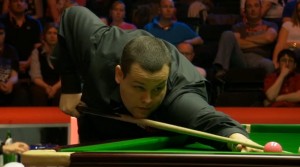
Back on tour – Igor Figueiredo
So new areas of interest, the Middle East, India, the Americas region, who knows? There is so much untapped opportunity for this game. I get to see it first hand, it is incredible, but you have got to develop it properly. It’s no good thinking that you can go in, put an event on, take a load of money out of the country and come back the following year. When you go back next year, it won’t be there.
You have to develop the sport, you have to work with the government, you have to work with the sports authorities and you have to develop the sport properly in order to maintain long term funding.
PSB: You mentioned Brandon Parker earlier, I was talking to him a few days ago and he spoke about the new European Tour event at Mulheim an der Ruhr, which is among the most densely populated area in Europe and sounds like an exciting event…
JF: Yeah it is exciting. Brandon has been terrific really, he’s brought quite a lot to the party in terms of the German Masters. Germany is a bit of a specialism of Brandon’s, with his Dragonstars partners in Germany, who he works very closely with.
That’s what you need in these countries, you need people on the ground, you can’t do it all from the UK, you have got to have partners. Brandon works with a great bunch of people out there, who run great events and I think that will be a really interesting one.
Again, some of the events that he has started, you have seen massive audiences, not only on television, but also in the arena. The one in Antwerp for example, 1,500 people watching a European Tour event, what potential to harness really.
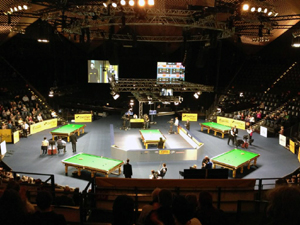
The Tempodrom, Berlin
And the other one of interest at the moment is actually Russia. We have seen strong growth throughout Eastern Europe. Interestingly enough, cue sports are very popular in Russia. They play Russian pyramids there, they also play pool, but what we are also finding now through some of the Eurosport coverage and through some of the amateur events that we have been staging is that participation levels in snooker are fast on the up.
There is great potential out there to stage an event and hopefully again that is something that we can introduce through the European Tour.
PSB: China too is obviously well established and this week, seeing the magazines and talking to their journalists, I have realised how seriously they treat the sport. It is hard for people to appreciate here in the UK isn’t it? It’s massive.
JF: It is. It’s not just there either, we are seeing growth in other areas, but China in particular has really grasped snooker. Snooker suits the Chinese people very well. They are not necessarily big people generally, they are not built for rugby and some of the big physical sports, but snooker certainly suits the culture of the Chinese people who love technical sports, the skill, discipline and they work so hard the players that practice, they train hard.
Amazingly, we have opened a World Snooker Academy in Beijing recently and trained the first World Snooker coaching team in China. Again, we will be looking to introduce some of the programme that we have been doing throughout the schools in China. We’ve already got a few schools on the go already out there but again the level of participation and the fact that our audience in China is so much younger as well, you have only got to look at the sponsors that we have, premium sponsors that you would dream of.

It is very popular is snooker, it’s cool, it’s trendy, we get all the best stuff in China. We get all of the fashion magazines involved. You have seen the quality of the billiard magazines, all these things that you would never think would have an interest in snooker, have done these features. There’s more to follow. It’s important, we’re not just a sport that goes in, runs an event and then runs off for a year and the comes back. We are now building a platform where the sport can remain solid.
PSB: It clearly is big, but there is that problem with the crowds that appear to be relatively low on the televison from the events in China and it is just getting that across here isn’t it?
JF: It is. Certainly they do not market tickets like we do here in the UK for sporting events. Many sporting events in China you are free to just walk in and out as you please, it’s very relaxed in terms of people going to the venues and watching.
Also, there tends to be a lot of corporate sold, so some of the seats that you will see empty, a lot of the time the VIP room will be full and that is their prerogative. They are great sponsors and it is part and parcel. It doesn’t form part of the business plan, the same as in the UK, that’s what you have to understand. It is a very different environment that we work in. It is very, very formal and we have to respect the cultures of the people that we are dealing with and that’s what we do.
PSB: While we are running out of time, we have a few questions in on Twitter, starting with a cheeky one from @davehendon who asks what is your favourite snooker magazine?
JF: I have got two, Snooker Scene and Ibilliard. Ibilliard is great. I love reading Snooker Scene though and one of the things that I have found with that is that every time it comes out there is so much more in it because there is so much more going on and I do read it. Clive has been around for many years and is a voice of experience..
PSB: On another note, @papafleming asks ‘will all the top names reaching end of career together have an adverse impact on the game?’
JF: No, because there will always be a new top player coming through, you can see this over the years. Everybody said that when Alex Higgins went, the game would die, when Stephen Hendry went the game would die, when Steve Davis started to slip a bit, then Stephen Hendry came along, he was the new boy on the block.
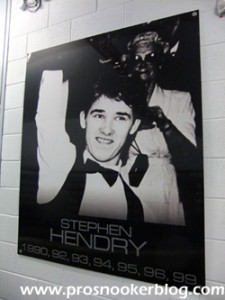
We’ve got some new stars here this week so it’s an ever-evolving tour, there will always be top players and new stories.
PSB: Next up, @victori75314839 asks: ‘who is his favourite player and what he thinks about Bulgaria??
JF: Bulgaria I am very excited with. Bulgaria I thought last year was terrific, I have actually been out there and met with the sports minister recently and he’s actually stepped in and is going to support the event further this year. So we are looking to build that one up.
I think that area has got potential. Again, I had the opportunity to go out there for a couple of days and when you go out on the streets, you see it on the big screens, in other places being played and it was clearly very popular. So yeah, exciting area for us that.
My favourite player? I wouldn’t normally comment on that, but my hero was Steve Davis as a youngster and really I can’t thank him enough for the ambassadorial role that he does now. I think that he does such a terrific job, every time I ask him to come out and do something, he does it in a professional style.
PSB: This has already been asked, but @snookerorg (a brilliant site incidentally), asks: ‘I see a great number of Russian visitors to my site. Any plans of a ranking event there?’
JF: We have got plans for Russia. We have actually got some Russian speaking people who we are working with now and we are actually in talks with Russia, so hopefully we might get a European Tour, or a bigger event over there. We are excited about the possibility of going to Russia.
PSB: Next up, @butters_147 asks: ‘Will World Snooker ever set foot in Canada again? #ThanksMatt’
JF: Snooker is a little bit weak still in Canada. In terms of participation it is very low in Canada. Predominantly 9-ball pool is the leading cue sport there.
But what you may also find very interesting, is that there is a huge English billiards tour league in Winnipeg and for the first time ever we are taking an English Billiards ranking event to Canada this year.
So while we do that, we will obviously be investigating the opportunity of growing snooker there.
PSB: Fair enough! And finally, we have @thewizardofglos who asks ‘when will the snookerbacker classic winner win a main tour spot #WizardTours’ as well as @snookerbacker1 who echoes that with: ‘What Wizard said’
JF: He’s hilarious that boy, absolutely hilarious!
PSB: And I think that just about covers everything! Thank you very much for your time!
